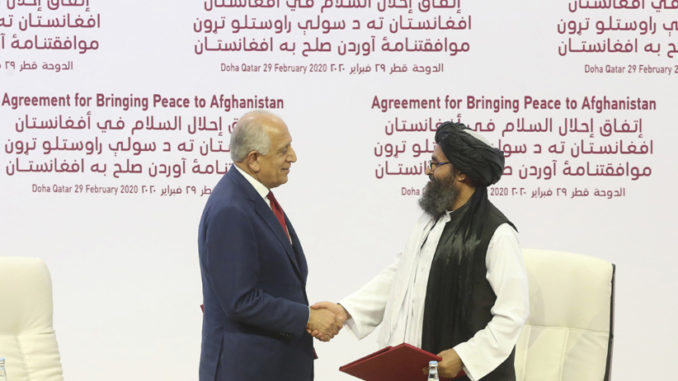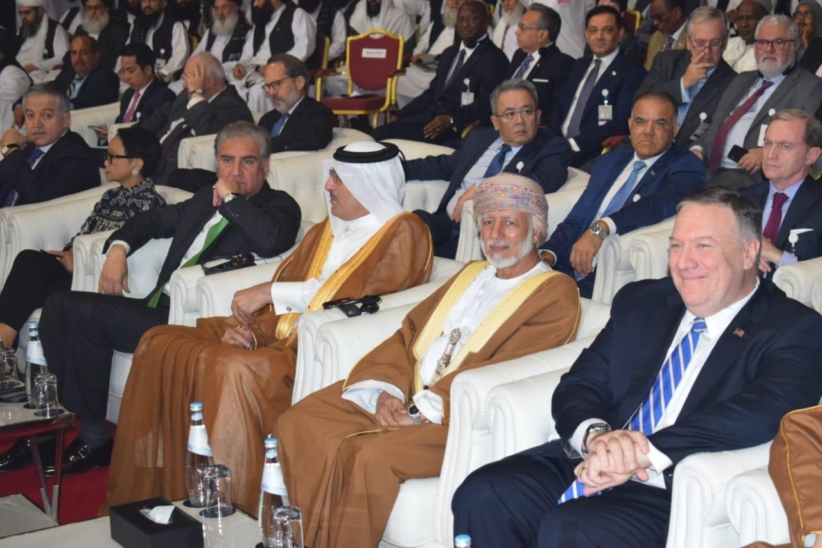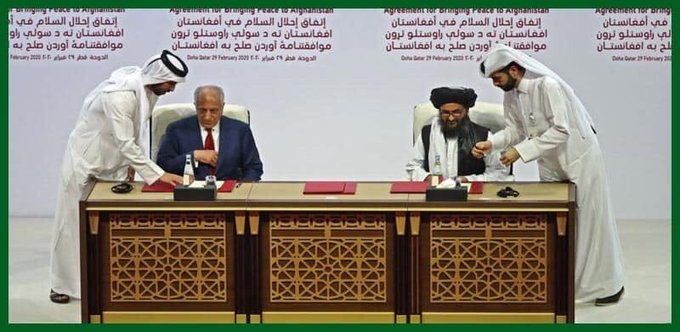
DOHA – The United States and the Taliban have signed a historic agreement to end an 18-year war in Afghanistan.
The deal aims to bring US soldiers home after almost two decades of bloody fighting. Washington will begin reducing the number of troops, while sustaining a counterterrorism force to continue dismantling terrorist groups that seek to attack the United States.
The U.S. Special Representative for Afghanistan Reconciliation Zalmay Khalilzad and representative of Taliban Mullah Abdul Ghani Baradar signed the agreement in Qatar’s capital, Doha. The signing ceremony was witnessed by Qatari Emir, U.S. Secretary of State Mike Pompeo and leaders from Pakistan, Qatar, Turkey, India, Indonesia, Uzbekistan and Tajikistan among others.

According to the agreement, “The Taliban will not allow any of its members, other individuals or groups, including Al Qaeda, to use the soil of Afghanistan to threaten the security of the United States and its allies.”
The agreement stipulates that the U.S. will reduce the number of its forces in Afghanistan from 13,000 to 8,600 in the next 135 days, and withdraw completely in 14 months, provided the Taliban keeps their commitments to prevent terrorism.
In addition, the U.S. committed to lifting U.S. sanctions on the Taliban and working with members of the United Nations Security Council to remove sanctions against members of the Taliban within three months. It also committed to working with the sides to secure the release of up to 5,000 prisoners held by Afghanistan and 1,000 prisoners held by the Taliban.
In exchange, the Taliban will not use Afghan soil to launch terror attacks which threaten U.S. security, and intra-Afghan negotiations will begin on March 10. There will also be a “permanent and comprehensive ceasefire.”
Taliban, in a statement, said they had reached an agreement “about the termination of occupation of Afghanistan.”
“The accord about the complete withdrawal of all foreign forces from Afghanistan and never intervening in its affairs in the future is undoubtedly a great achievement,” it read.
Earlier on Saturday, the Taliban ordered all its fighters to halt fighting and “refrain from attacks.”

In Doha, Mullah Abdul Ghani Baradar said “we want unity and prosperity of our country and for this reason I call upon all factions to make this deal working.”
In his address, Mike Pompeo said the U.S. was “realistic” about the agreement, but saw it as “the best opportunity for peace in a generation.” He added that reduction in violence is not perfect, but at least Taliban demonstrated that when they have the will to be peaceful, they can be.
Pompeo also appreciated the U.S. Representative for Afghanistan Reconciliation Zalmay Khalilzad, who “played a critical role in making the negotiations successful”. The U.S. Secretary of State urged Taliban to sit with Afghan government to determine the course for future of Afghanistan.
Today is a day to remember. We must remember the lessons of history, and the darkness of conflict. I call on all Afghans to learn from the past, and work together to build a a stable, inclusive future for their children.
— U.S. Special Representative Zalmay Khalilzad (@US4AfghanPeace) February 29, 2020
Pakistan, China, Russia, Iran, Uzbekistan, Norway, and Indonesia provided assistance and support in making the deal success.
Nearly 3,500 members of the international coalition forces have died in Afghanistan since the 2001 invasion.
The figures for Afghan civilians, militants and government forces are more difficult to quantify. In a February 2019 report, the UN said that more than 32,000 civilians had died. The Watson Institute at Brown University says 58,000 security personnel and 42,000 opposition combatants have been killed.



